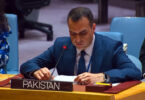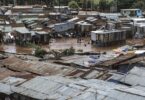DUSHANBE (TASS): The trilateral meeting of the Foreign Ministers of the Russian Federation, Azerb-aijan and Armenia started on Thursday in Dushanbe.
At the beginning of the meeting, Minister of Foreign Affairs of the Russian Federation Sergey Lavrov thanked his colleagues from Azerbaijan and Armenia Jeyhun Bayramov and Ararat Mirzoyan for responding to the proposal of the Russian side “to take advantage of the participation of the CIS Ministerial Council for holding a meeting for three, which will allow us to continue joint work on monitoring the implementation of tripartite statements” that were previously adopted at the highest level.
“We are interested in turning the South Caucasus into a zone of peace, sustainable development and prosperity,” the head of the Russian diplomatic department said, adding that it is important for Moscow to increase trust between the parties while creating conditions for the full normalization of Armenian-Azerbaijani relations. “I hope that today’s meeting will make it possible to move forward along the path that was outlined by our leaders,” Lavrov said.
In turn, Azerbaijani Foreign Minister Bayramov stressed in his opening speech that this meeting “is a good opportunity to discuss the progress that can be achieved.” At the same time, he expressed regret due to the fact that so far there are no proper improvements in the work on opening transport communications in the region. “I know that contacts between colleagues continue. And we believe that there is a good prospect, a good opportunity to achieve results and achieve full implementation of tripartite statements,” he said. I believe that there are good developments, understanding in terms of the composition and representativeness of the parties in the commission on delimitation issues, and I also believe that in the near future it will be possible, at least.
At the beginning of the meeting of ministers, Armenian Foreign Minister Mirzoyan stressed that Yerevan was and remains committed to the implementation of all agreements and statements between the leaders of the three countries. “We are ready to continue all work on the current formats: on opening communications of economic infrastructures in the region, and on a peace treaty, or, as it is probably more correct to call it, an agreement on the normalization of relations, the establishment of relations, and on the solution of all remaining problems, including humanitarian ones, release of prisoners of war and other issues that remain unresolved,” he said.






